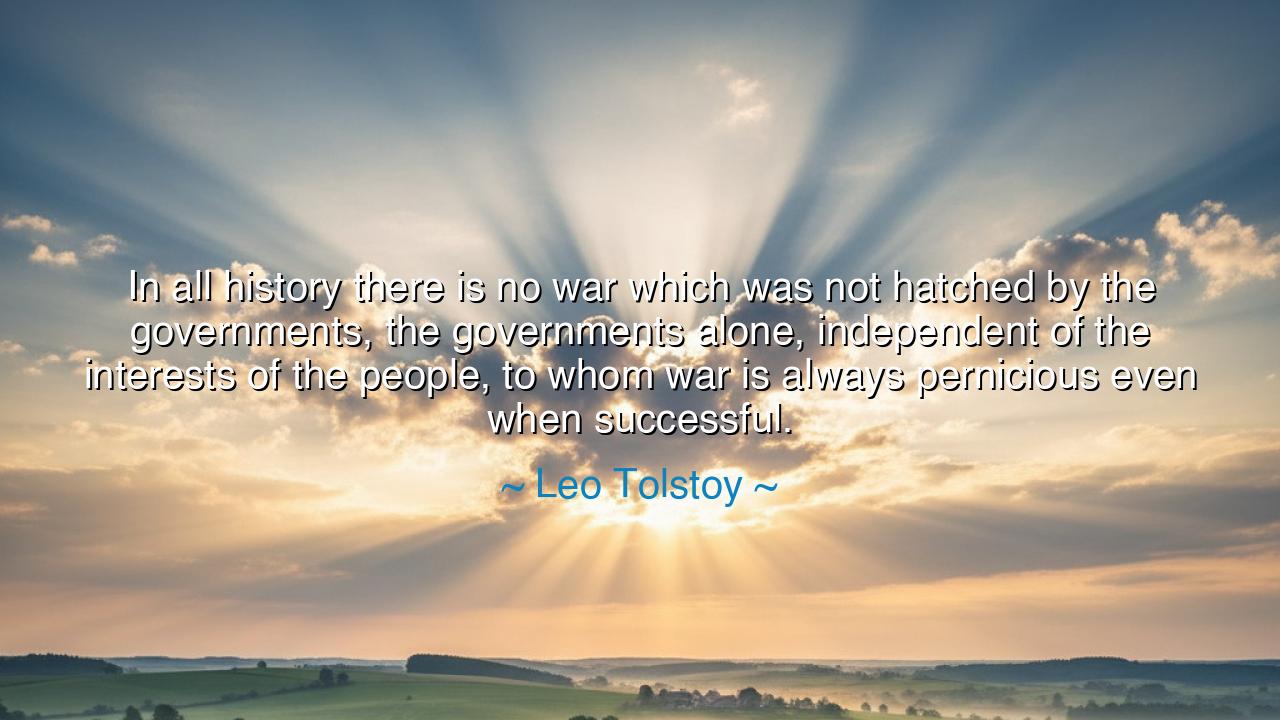
In all history there is no war which was not hatched by the
In all history there is no war which was not hatched by the governments, the governments alone, independent of the interests of the people, to whom war is always pernicious even when successful.






War, that scourge of humankind, has stained the pages of history with blood and sorrow. Yet, in the words of Leo Tolstoy, it is not the people who seek it, nor is it born from their will. Instead, war is birthed from the desires and decisions of governments, those who hold power over the many, but who are often far removed from the suffering their choices inflict. Governments alone, Tolstoy declares, are the architects of these terrible conflicts, indifferent to the pain and loss experienced by the common folk. For the people, even in victory, war brings nothing but destruction, and this is a truth as old as time itself.
To understand this, one must turn to the annals of history. Think of the Napoleonic Wars, those vast conflicts that spread across Europe, claiming countless lives. It was Napoleon Bonaparte, a man of extraordinary ambition, who sought to reshape the continent to his will. The people, though they fought for their lives and their lands, did not ask for such a war. It was governments—kings, emperors, and ministers—who made the fateful decisions to wage battle. Napoleon's victories, though resounding, brought no peace or prosperity to the people. In the end, his empire fell, and the common folk were left to bear the heavy toll of his dreams of glory.
History is replete with such examples, where the desires of rulers have led to the devastation of those they govern. In the First World War, the people of Europe did not seek war. They did not cry out for trenches, for the slaughter of their sons and brothers, nor for the tearing apart of the very fabric of their societies. Empires, hungry for power, for territory, for prestige, marched their nations into the abyss of destruction. The people's interests were secondary, or even invisible, in the face of the imperial ambitions that guided the hands of the rulers. And though the war ended in victory for some, the toll on the people was immeasurable—families shattered, economies ruined, and nations broken.
Even when war appears victorious, the true cost remains hidden from the eyes of those in power. For victory in battle does not heal the wounds of the heart, nor does it restore the lives lost in the pursuit of it. In the aftermath of war, the people are left to rebuild their lives from the ashes of the destruction their rulers have wrought. Governments may claim success, but to the common people, success is but a hollow echo, a fleeting moment of relief in a lifetime of grief. Tolstoy’s words remind us that war, no matter its outcome, is always a curse upon the people. It is a reminder that the true cost of war is not measured in land gained or lost, but in the lives broken and the souls wounded.
This is not merely a theoretical lesson but a call to action for all who value peace. We, the people, must never forget that war is not the will of the masses. It is the will of those who seek power, and their ambitions often lead to the destruction of the very lives they claim to protect. Tolstoy’s wisdom urges us to stand firm in our demand for peace, to question the motives of those who would lead us into battle, and to recognize that the cost of war is always paid in blood and suffering.
As Tolstoy teaches us, the true heroism lies not in fighting but in the courage to resist. The lesson is clear: we must not be swayed by the empty promises of those who claim that war is inevitable or necessary. Instead, we must demand that our leaders seek peace, even when the drums of war grow loud and the winds of battle call. For the people are always the ones who suffer, and in the end, it is the people's will that should guide the course of history.
Let us, then, learn from history. Let us cherish the lessons passed down by those who have witnessed the horrors of war. Let us choose peace, not because it is easy, but because it is the path that preserves the dignity of humanity. The lesson of Leo Tolstoy is a timeless one: war is never the answer, for it is always the people who pay the price. Let us stand together, united in our desire for peace, and demand that our leaders choose the path of wisdom, not the path of destruction.






AAdministratorAdministrator
Welcome, honored guests. Please leave a comment, we will respond soon